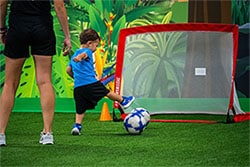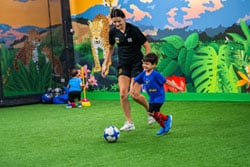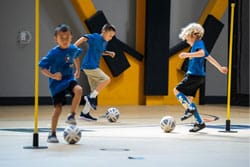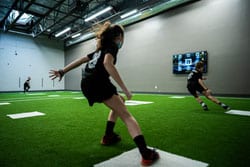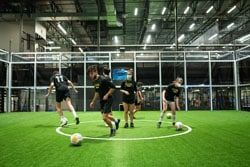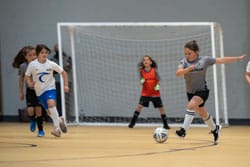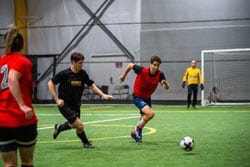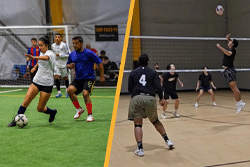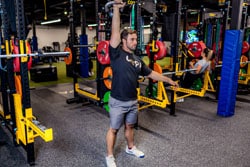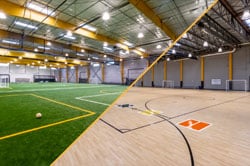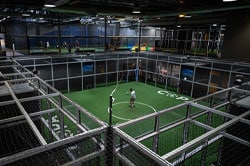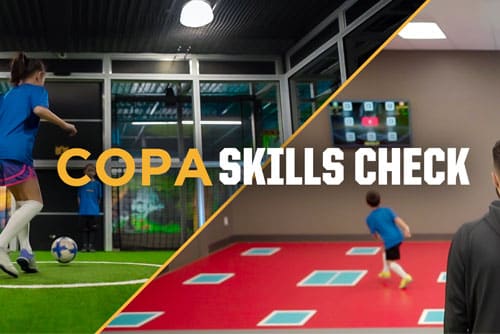COPA Soccer Training Center’s Mission
Player identification and development in soccer have been heavily influenced by subjective observation. We are changing the game to give everyone an equal opportunity to achieve their goals.
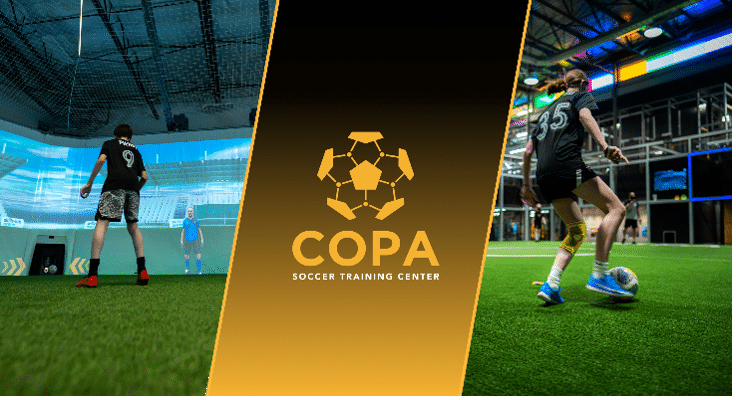
Comprehensive
Objective
Performance
Assessment
Objective
Performance
Assessment
ComprehensiveObjectivePerformanceAssessment
COPA’s Mission
Our goal is to become the global standard for both player identification and assessment-oriented youth development in the sport of soccer. We strive to elevate the performance of every young soccer player and to see them reach their full potential. Accomplishing this starts with the development and systematic application of objective performance assessments in a technology-enhanced “laboratory” training environment. Through the accumulation of thousands of regular assessments, we can assist players of all ages and gender by providing objective information on peer comparative metrics around any number of desired indicators, including skills, physicality, decision-making, game intelligence insights, and other evaluations. In time, this information will also provide the ingredients necessary to derive powerful insights into how training regimens affect player development over time. These data points provide a quantitative benchmark used to measure an athlete’s progress and compare their skills-specific performance to their peers and their heroes. Eventually, players will even be able to measure their performance against collegiate teams, club teams, or even professional organizations that they may aspire to join. COPA is committing the resources needed to make a long-term investment in the development of data-based knowledge in the growth of player-specific soccer skills.
For the past seven years, COPA STC has been collaborating behind the scenes with specific professional clubs and technology companies around the world in pursuit of a quantitative, objective, and scalable method to democratize talent identification and optimize player development for the full range of soccer enthusiasts; from early-stage players to elite level talent. By combining the world’s leading assessment technologies with our own proprietary ones, COPA aims to provide the most effective process to identify potential talent and assist in the long-term development of all athletes regardless of age or initial skill level.
Player Identification
Due to the lack of both player-specific and peer-based objective data to support decision-making in the sport of soccer (particularly regarding youth players), player evaluation and selection become heavily influenced by the personal and subjective intuitions of coaches, scouts, technical directors, or other decision-makers. This same data-challenged ecosystem prevails in the player development process where many training decisions are determined by intuition rather than by objective information. No matter how great a coach is at observing talent, anyone is subject to fault using incomplete or limited information. Historically, player development, particularly among younger players, has lacked the integration of the latest advances in science and technology. COPA aims to fix that.
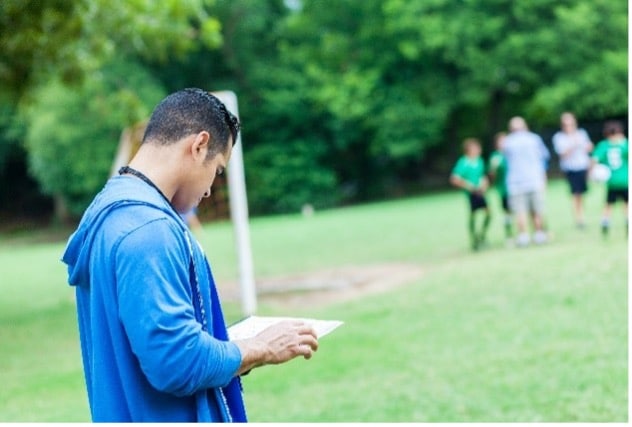
It’s virtually impossible for a coach to objectively evaluate everyone during tryouts.
The utilization of cutting-edge science and technology to generate data used for benchmarking and analysis of the effectiveness of training methodologies is critical. Empirical analysis rooted in objective evidence will provide players and coaches with the potential for more accurate, effective, and rational decisions in player development.
Player Development
Coaches invariably expect players to improve. At the grassroots level, a parent will hear, “Your child is getting better.” But as a parent, how do you know if they are actually getting better? Are you curious about what they are getting better at? What are the relative strengths of weaknesses of your child? What do they need to work on to reach their goals? What is the information that influences the development of your child’s goals in the first place? How does your child compare to other players locally, regionally, nationally, and internationally? How are core skills currently being measured and objectively quantified in your child’s soccer club presently? What about in youth soccer clubs across the world?
Over the past five years, a handful of elite professional soccer clubs around the world have invested heavily to integrate technologies that produce quantitative data to assess and train their players across every age, ability level, and gender. As clubs modernize their approach, they are in pursuit of optimizing their team selections and player development models by removing subjectivity and relying on objective data to make informed decisions. For example, Bayern Munich utilizes the same technology stack (skills.lab Arena, SpeedTrack, and SpeedCourt) as COPA STC to assess, scout, and individually train their youth and professional players. Jochen Sauer, the Head of FC Bayern Academy, believes the skills.lab Arena is a unique differentiator in talent ID and development because it is “the only holistic football training system that allows us to objectively assess the football-specific skills of a player and improve those skills individually.”
Through the advancement of research in the field of neuroscience and skill acquisition, we are now aware of more effective strategies and interventions that accelerate learning beyond traditional methods. In most cases, these methodologies have yet to be integrated into local youth sporting organizations that are responsible for positively influencing the development of the next generation.
Gamification is the application of gaming design elements (points, badges, competition, leaderboards, and performance graphs) to non-gaming environments to make difficult tasks more palatable, increase engagement through the thrill of competition, and motivate people to achieve their goals. Gamification creates a feeling of accomplishment which is an important element in learning. The goal of gamification in a practice environment is to foster enhanced motivation and love for the game through the generation of gamified emotional engagement.
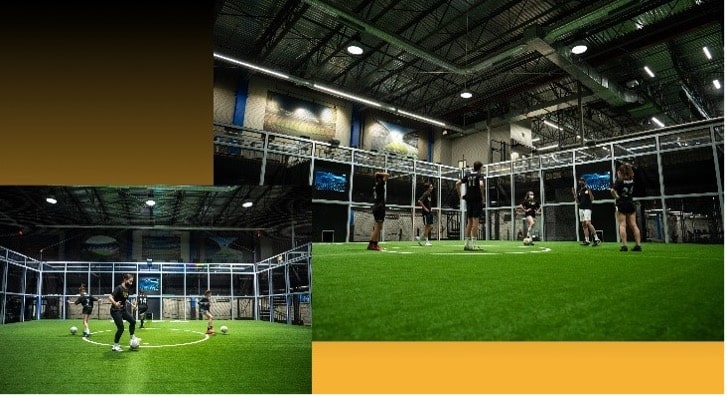
COPA STC combines cutting-edge technology and modern training methodologies to gamify the development of our athletes.
Renowned authority around the science and methodologies of learning, Dr. Anders Ericsson, has done groundbreaking work around emotional engagement when used in deliberate practice, which is illustrative of this point. Over the last twenty years, neurophysiological research has determined that enhanced emotional engagement signals the brain subconsciously resulting in substantially more rapid neural pathway development. Traditionally, gamification within the sport of soccer has been limited to game play itself. Gamification of practice, as a strategy to enhance skills development, is a powerful and effective approach to accelerate results.
COPA Score
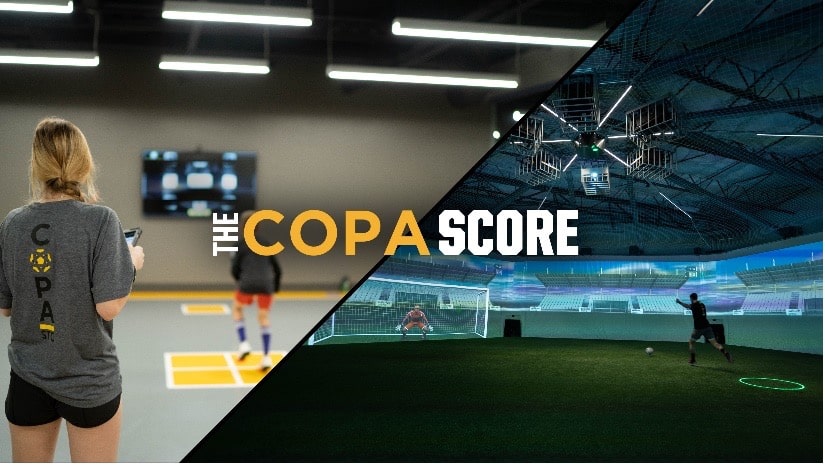
Gamification is the application of gaming design elements (points, badges, competition, leaderboards, and performance graphs) to non-game play environments, such as practice, to make what can often seem to be difficult, monotonous, or otherwise hard tasks become more palatable. Increasing motivation and engagement through the thrill of competition, helps people to achieve their goals. Gamification creates a feeling of accomplishment which is an important element in learning. The goal of gamification in a practice environment is to foster enhanced motivation and love for the game through the generation of gamified emotional engagement.
Here is a play-by-play to better understand the COPA Score:
1. We begin by collecting objective quantitative data measuring an athlete’s strength, speed, agility, passing, ball control, finishing, and decision-making skills from a curated selection of advanced training technologies.
2. Next, our proprietary algorithms analyze, compile, compare, and organize individual data points against our large proprietary database to produce an engaging and informative scorecard.
3. The scorecard provides an in-depth analysis of your data and a single composite score – the COPA Score. Your COPA Score determines your training level, which we use to objectively establish training groups of similarly skilled players.
4. Percentile ranks provide insight into your strengths and weaknesses relative to athletes your age and gender while benchmarks of aspirational populations provide context into what scores it takes to reach the next level.
5. A training recommendation is provided to guide and optimize your skills development process. Our proprietary algorithms generate this training recommendation from the data contained within the composite profile of your COPA Score.
6. And finally, as you periodically update your COPA Score, we can objectively track your progress, update your training level, re-optimize your training plan, and ultimately gamify your development in a fun and challenging environment.
2. Next, our proprietary algorithms analyze, compile, compare, and organize individual data points against our large proprietary database to produce an engaging and informative scorecard.
3. The scorecard provides an in-depth analysis of your data and a single composite score – the COPA Score. Your COPA Score determines your training level, which we use to objectively establish training groups of similarly skilled players.
4. Percentile ranks provide insight into your strengths and weaknesses relative to athletes your age and gender while benchmarks of aspirational populations provide context into what scores it takes to reach the next level.
5. A training recommendation is provided to guide and optimize your skills development process. Our proprietary algorithms generate this training recommendation from the data contained within the composite profile of your COPA Score.
6. And finally, as you periodically update your COPA Score, we can objectively track your progress, update your training level, re-optimize your training plan, and ultimately gamify your development in a fun and challenging environment.
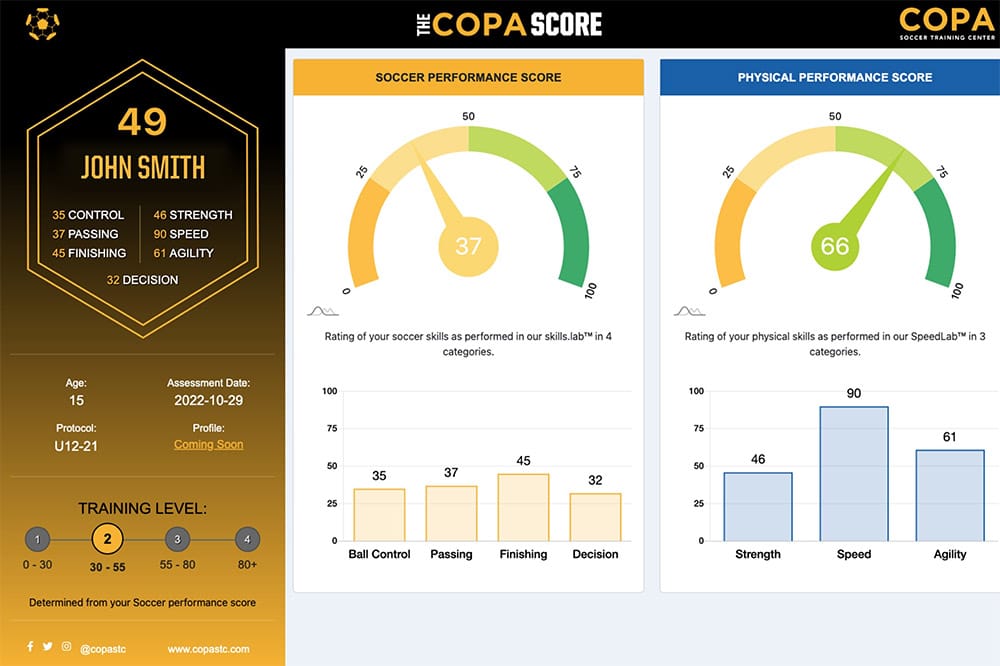
The comparative data inform us of the next phase of training. Once we identify strengths and gaps against a database, we can individualize development plans to optimize the development process. Our coaching staff designs an array of small-group training sessions tailored to the individual needs of an athlete. COPA coaches, certified in the use and operation of the technology and interpretation of the data, leverage a purposeful training methodology to maximize skill development through emotional engagement and purposeful intent. At the core of our methodology is the power of deliberate and intentional practice to positively influence cognitive development. Brain function and skills acquisition is accelerated when the emotional drive of the player is elevated.
Transformation Process
The COPA Score has been designed to become an industry standard progress reporting tool for players and parents. Collegiate and professional coaches, scouts, recruiters, technical directors and others can also use the COPA Score to assess player’s skills and potential. Many industries have developed standard assessment tools, used to evaluate attributes or products of industry elements. From standardized College entrance exams to the “Kelley Blue Book” used to evaluate used cars, standardized evaluation tools which use objectively obtained data to generate performance indicating metrics can be a valuable contribution to understand relational comparisons, and changes over time.
By establishing benchmarks, the COPA Score can be used as a filtering mechanism, to evaluate hundreds or even thousands of individual players in any particular peer grouping, and be used to establish pre-tryout qualification standards, accurately, objectively, and on a large scale basis. Colleges, Clubs, and Soccer Organizations can rely on COPA STC expertise to conduct pre-tryout initial talent evaluation, as well as evaluating the players within their existing teams, and generate useful comparisons in “apples to apples” comparisons of fundamental technical, physical, and cognitive skills. Players who have a COPA Score will have a unique, powerful, and objective tool to market their talents to the next level in their soccer journey, whether in a youth Club, Collegiate acceptance consideration, or Professional Team try-out consideration. Plus, the COPA Score is simply a fun and useful way to track personal growth and compare your progress with your friends, peers, and heroes.
Let’s change the game. Join us in pioneering an objective, data-driven player development revolution leveraging cutting-edge science and technology.
To learn more about COPA STC’s bright future, please check out:

